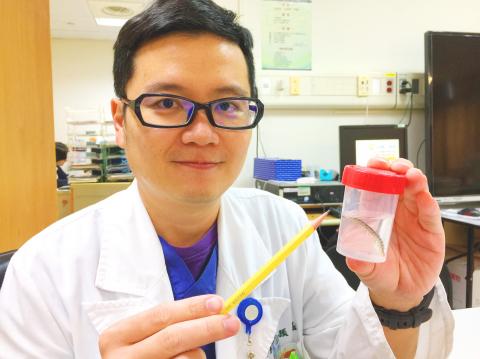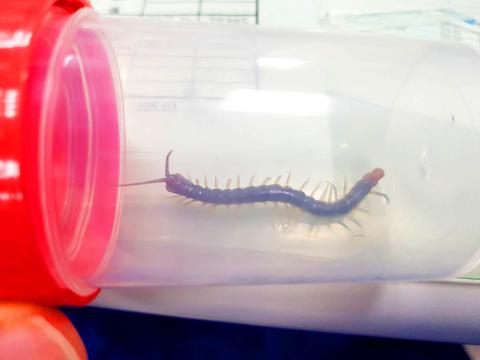A 5cm-long live centipede was found in the ear of an elementary-school boy in Chiayi County’s Dalin Township (大林).
In the early morning of Oct. 25, the boy felt a sudden pain and heard abnormal sounds in one of his ears, so his parents immediately took him to see a doctor at Dalin Tzu Chi General Hospital.
Emergency physician Lee Chen-wei (李振威) treated him.

Photo: Tseng Nai-chiang, Taipei Times
The boy was yelling because his ear hurt, Lee said on Monday.
Lee said that he took him into a consultation room for a checkup and discovered something black and long moving in his ear.
At first, he only told the boy and his parents that there seemed to be an unknown object in his ear, because he was worried it would make them too nervous, Lee said, adding that when he used forceps to remove the object, they were all shocked to see a struggling black centipede come out.

Photo courtesy of Dalin Tzu Chi General Hospital
He said the boy was brave and did not cry, but did exclaim: “Yuck!”
As the boy’s ear canal had been slightly hurt by the centipede, Lee said he prescribed liquid antibiotics and painkillers, and conducted a hearing test and eardrum checkup to make sure no damage was done.
As centipedes like to be in dark, warm places, it probably crawled into the boy’s ear when he was asleep, Lee said, adding that Dalin Township is a rural area and the boy lives near farmlands.
People who live in rural areas and near brush or farmland should sleep with a mosquito net over their bed to keep centipedes and insects away, he said.

The inspection equipment and data transmission system for new robotic dogs that Taipei is planning to use for sidewalk patrols were developed by a Taiwanese company, the city’s New Construction Office said today, dismissing concerns that the China-made robots could pose a security risk. The city is bringing in smart robotic dogs to help with sidewalk inspections, Taipei Deputy Mayor Lee Ssu-chuan (李四川) said on Facebook. Equipped with a panoramic surveillance system, the robots would be able to automatically flag problems and easily navigate narrow sidewalks, making inspections faster and more accurate, Lee said. By collecting more accurate data, they would help Taipei

TAKING STOCK: The USMC is rebuilding a once-abandoned airfield in Palau to support large-scale ground operations as China’s missile range grows, Naval News reported The US Marine Corps (USMC) is considering new sites for stockpiling equipment in the West Pacific to harden military supply chains and enhance mobility across the Indo-Pacific region, US-based Naval News reported on Saturday. The proposed sites in Palau — one of Taiwan’s diplomatic allies — and Australia would enable a “rapid standup of stored equipment within a year” of the program’s approval, the report said, citing documents published by the USMC last month. In Palau, the service is rebuilding a formerly abandoned World War II-era airfield and establishing ancillary structures to support large-scale ground operations “as China’s missile range and magazine

A 72-year-old man in Kaohsiung was sentenced to 40 days in jail after he was found having sex with a 67-year-old woman under a slide in a public park on Sunday afternoon. At 3pm on Sunday, a mother surnamed Liang (梁) was with her child at a neighborhood park when they found the man, surnamed Tsai (蔡), and woman, surnamed Huang (黃), underneath the slide. Liang took her child away from the scene, took photographs of the two and called the police, who arrived and arrested the couple. During questioning, Tsai told police that he had met Huang that day and offered to

BETTER SERVICE QUALITY: From Nov. 10, tickets with reserved seats would only be valid for the date, train and route specified on the ticket, THSRC said Starting on Nov. 10, high-speed rail passengers with reserved seats would be required to exchange their tickets to board an earlier train. Passengers with reserved seats on a specific train are currently allowed to board earlier trains on the same day and sit in non-reserved cars, but as this is happening increasingly often, and affecting quality of travel and ticket sales, Taiwan High-Speed Rail Corp (THSRC) announced that it would be canceling the policy on Nov. 10. It is one of several new measures launched by THSRC chairman Shih Che (史哲) to improve the quality of service, it said. The company also said